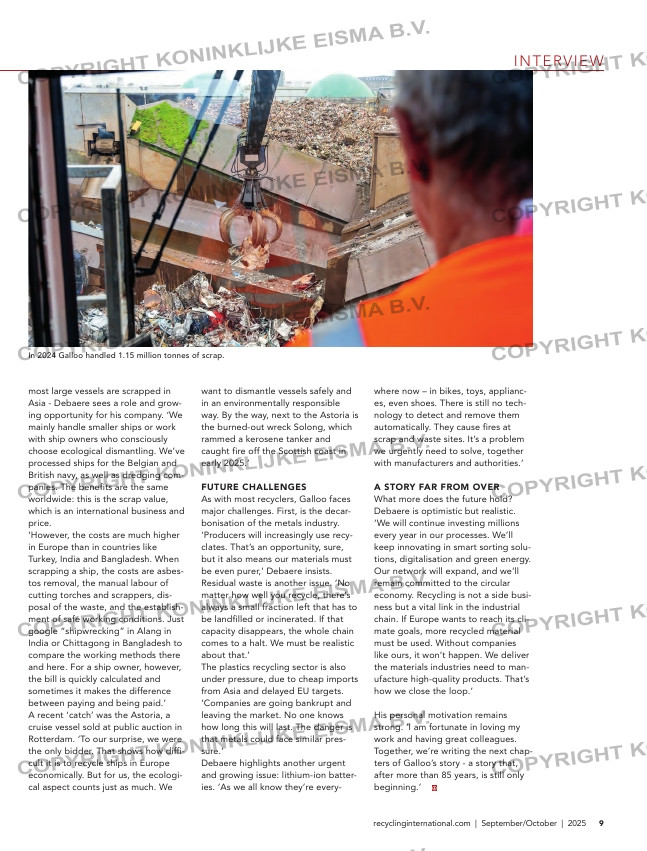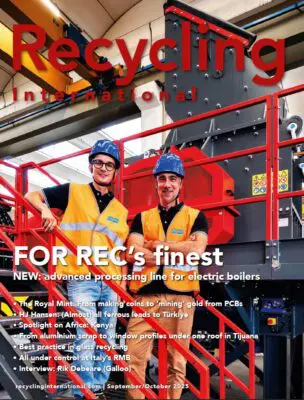Page 9 from: Recycling International September/October 2025

INTERVIEW
9recyclinginternational.com | September/October | 2025
refinement is crucial. The metals
industry has to decarbonise and that
can only be achieved by using more
recycled raw materials. We want to
supply our customers with recyclates
of the highest quality; that’s our con-
tribution to the circular economy.’
NEW FRENCH SHREDDER
One of Galloo’s biggest current proj-
ects is the construction of a new 4000
HP Lindemann shredder in Harnes,
northern France. ‘It took us eight
years to find the right site and secure
the permits. For such a plant you
need water access, sufficient space
and the right permits. Work started in
early 2025. The 130-metre quay is
under full construction and we are
now starting the foundation works. By
mid-2027 we expect the shredder to
be operational.’
The installation, comparable to the
one in Halluin, will process up to 15
000 tonnes of scrap per month. But
Debaere cautions: ‘The question is
not what you can technically produce
but what you can purchase. Capacity
without supply is worthless.’
LOGISTICS SUCCESS
Since the early days, logistics have
been central to Galloo’s strategy.
Where transport once relied mainly
on rail, the focus has shifted to inland
and maritime shipping. ‘The purchase
of the Van Heyghen site in the Port of
Ghent in 2002 was decisive,’ says
Debaere. ‘With direct access to deep
water, we built our export hub there.
Today, 800 000 to 900 000 tonnes are
shipped to destinations all over the
world.’
Inland waterways are increasingly
important. ‘Scrap is perfect for water
transport: large volumes, bulk, non-
perishable. We operate two push-
barges of our own and work with
external partners, too. It’s complex
but much more sustainable than road
transport.’
SHIP RECYCLING, TOO
In addition to metal recycling, Galloo
also dismantles and recycles ships.
While this remains a niche in Europe –
most large vessels are scrapped in
Asia – Debaere sees a role and grow-
ing opportunity for his company. ‘We
mainly handle smaller ships or work
with ship owners who consciously
choose ecological dismantling. We’ve
processed ships for the Belgian and
British navy, as well as dredging com-
panies. The benefits are the same
worldwide: this is the scrap value,
which is an international business and
price.
‘However, the costs are much higher
in Europe than in countries like
Turkey, India and Bangladesh. When
scrapping a ship, the costs are asbes-
tos removal, the manual labour of
cutting torches and scrappers, dis-
posal of the waste, and the establish-
ment of safe working conditions. Just
google “shipwrecking” in Alang in
India or Chittagong in Bangladesh to
compare the working methods there
and here. For a ship owner, however,
the bill is quickly calculated and
sometimes it makes the difference
between paying and being paid.’
A recent ‘catch’ was the Astoria, a
cruise vessel sold at public auction in
Rotterdam. ‘To our surprise, we were
the only bidder. That shows how diffi-
cult it is to recycle ships in Europe
economically. But for us, the ecologi-
cal aspect counts just as much. We
want to dismantle vessels safely and
in an environmentally responsible
way. By the way, next to the Astoria is
the burned-out wreck Solong, which
rammed a kerosene tanker and
caught fire off the Scottish coast in
early 2025.’
FUTURE CHALLENGES
As with most recyclers, Galloo faces
major challenges. First, is the decar-
bonisation of the metals industry.
‘Producers will increasingly use recy-
clates. That’s an opportunity, sure,
but it also means our materials must
be even purer,’ Debaere insists.
Residual waste is another issue. ‘No
matter how well you recycle, there’s
always a small fraction left that has to
be landfilled or incinerated. If that
capacity disappears, the whole chain
comes to a halt. We must be realistic
about that.’
The plastics recycling sector is also
under pressure, due to cheap imports
from Asia and delayed EU targets.
‘Companies are going bankrupt and
leaving the market. No one knows
how long this will last. The danger is
that metals could face similar pres-
sure.’
Debaere highlights another urgent
and growing issue: lithium-ion batter-
ies. ‘As we all know they’re every-
where now – in bikes, toys, applianc-
es, even shoes. There is still no tech-
nology to detect and remove them
automatically. They cause fires at
scrap and waste sites. It’s a problem
we urgently need to solve, together
with manufacturers and authorities.’
A STORY FAR FROM OVER
What more does the future hold?
Debaere is optimistic but realistic.
‘We will continue investing millions
every year in our processes. We’ll
keep innovating in smart sorting solu-
tions, digitalisation and green energy.
Our network will expand, and we’ll
remain committed to the circular
economy. Recycling is not a side busi-
ness but a vital link in the industrial
chain. If Europe wants to reach its cli-
mate goals, more recycled material
must be used. Without companies
like ours, it won’t happen. We deliver
the materials industries need to man-
ufacture high-quality products. That’s
how we close the loop.’
His personal motivation remains
strong. ‘I am fortunate in loving my
work and having great colleagues.
Together, we’re writing the next chap-
ters of Galloo’s story – a story that,
after more than 85 years, is still only
beginning.’
In 2024 Galloo handled 1.15 million tonnes of scrap.
06-07-08-09_interviewrikdebaere(galloo).indd 9 09-09-2025 08:44



